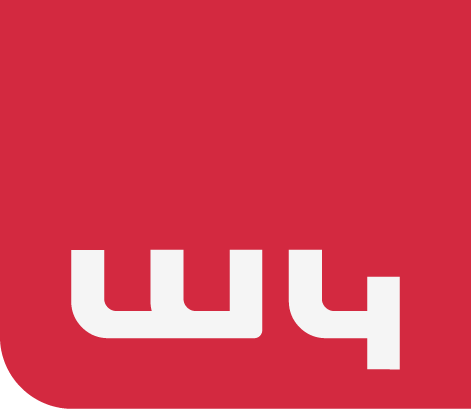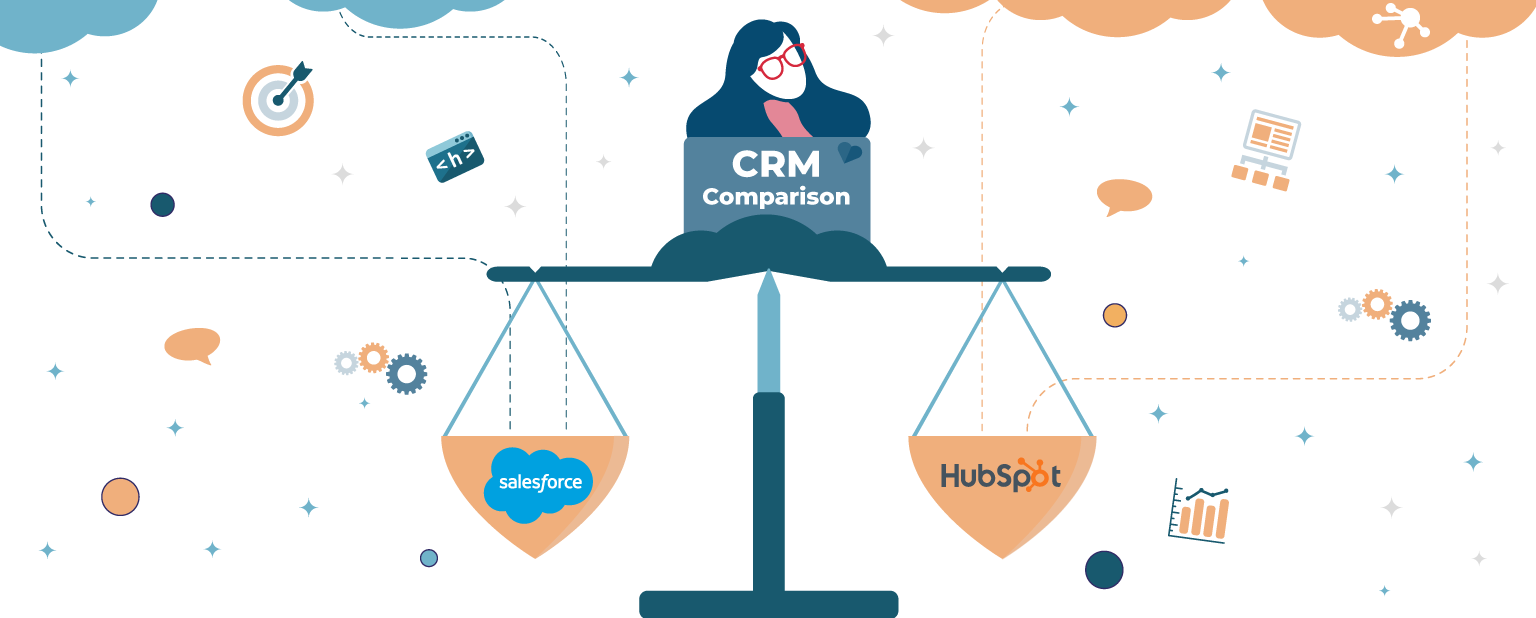Are you having trouble choosing the right CRM for your company? You are not alone. In a time when successful customer relationships determine business success, every company faces the same question: Which CRM system is the best for us?
CRM platforms such as HubSpot and Salesforce offer comprehensive tools that can revolutionize sales, marketing and customer service. But which solution is better suited to the needs of your company? While HubSpot scores with its ease of use and flexible pricing, Salesforce stands out with its comprehensive functions and almost unlimited customization options.
In this article, we'll not only show you the differences between HubSpot and Salesforce, but we'll help you find the CRM platform best suited to your specific business needs. Whether you're a small business with a limited budget or a large corporation with complex requirements - this comparison will give you the answers you need to make your decision.
basic structure of crm platforms
HubSpot: Seamless integration through hubs
HubSpot offers a fully integrated CRM platform built around five central hubs: Marketing, Sales, Content, Service, and Operations. Each of these hubs is designed to support specific business areas and work seamlessly with the others. This integrated structure ensures that all data and processes are organized in a consistent environment, resulting in easy user experience and quick adoption.
Companies looking for a quick implementation without major IT effort will find HubSpot as an ideal solution. The platform is particularly suitable for small and medium-sized companies that need an all-in-one solution to manage customer relationships and automate their marketing and sales processes. According to a survey by Gartner, 74% of HubSpot users said that ease of use and easy integration were a deciding factor in their choice.
Salesforce: Modular structure with flexible clouds
In contrast, Salesforce is based on a modular structure, with different clouds such as Sales Cloud, Marketing Cloud and Service Cloud providing specific functions. These modules have been added over the years through various extensions, resulting in an extremely flexible but also more complex platform. Companies can customize Salesforce to their requirements by selecting the functions they need and creating customized CRM solutions.
This flexibility makes Salesforce particularly attractive for larger companies with complex sales and business processes. They can make specific customizations and integrations to optimize their CRM processes. According to a G2 study, 80% of Salesforce users said that customization options were the most important reason for choosing this platform.
COMPARISON OF FUNCTIONS AND APPLICATIONS
HubSpot: Simplicity and comprehensive marketing, sales and service tools
Integrated CRM with comprehensive automation:
HubSpot offers a unified CRM that features full integration of marketing, sales, and service functions. A key benefit of HubSpot is the automation of repetitive tasks, including email marketing, contact management, deal tracking, and lead nurturing. For example, automated workflows allow marketing teams to send specific messages based on customer actions, improving conversion rates. According to an internal HubSpot study, companies were able to increase their lead generation by 50% by using the platform's automation tools.
SEO and content management made easy:
HubSpot offers comprehensive Search Engine Optimization tools to optimize website content and improve search engine visibility. Additionally, the content management system (CMS) allows marketing teams to create blogs and landing pages that are not only user-friendly but also have a significant impact on lead generation. These features are especially valuable for companies looking to efficiently scale their online marketing.
Email marketing and sales automation:
HubSpot allows companies to create targeted email campaigns and automated follow-up emails based on customer interactions. Sales teams benefit from sales automation, where deals and sales activities can be automatically logged and prioritized. According to HubSpot studies, this feature has led to a 50% increase in lead generation for users .
Analytics and reports:
HubSpot offers a variety of analytics and reporting tools that allow companies to track the effectiveness of their campaigns, sales processes, and customer care efforts in detail. Dashboards show in real time which activities have the greatest impact on business goals.
Salesforce: Maximum flexibility and profound customization options
Advanced sales automation with AI support:
Salesforce stands out for its powerful sales automation. Lead management, opportunity tracking and forecasting enable companies to optimize their entire sales process and avoid bottlenecks. With the integration of Salesforce Einstein, an AI-based platform, companies also have the ability to make accurate predictions for sales closings, which leads to optimized sales performance.
Marketing Cloud: Campaign management and lead scoring:
The Salesforce Marketing Cloud offers a variety of tools for managing campaigns, lead scoring and multichannel marketing. These functionalities allow companies to synchronize targeted campaigns on different channels such as email, social media or SMS. Lead scoring enables sales teams to focus their activities on the most promising leads and thus increase the ROI of their marketing measures.
Service Cloud: Excellent customer service and self-service portals:
Salesforce also offers a specialized Service Cloud that helps companies efficiently manage support tickets, customer inquiries, and community platforms. Self-service portals enable customers to find answers to their questions on their own, reducing support costs and increasing customer satisfaction.
High flexibility and customization:
Salesforce allows for a high degree of customization to meet specific business requirements. Companies can create custom applications that are tailored precisely to their internal processes. This makes Salesforce particularly attractive for large companies with complex workflows and specific requirements.
INTEGRATIONS AND ECOSYSTEMS
HubSpot: Flexible and easily expandable
HubSpot offers a variety of integrations with third-party tools that allow companies to expand their CRM environment quickly and easily. The HubSpot App Marketplace features over 270 integrations, including popular tools such as Gmail, WordPress, Slack, and e-commerce platforms such as Shopify. These integrations help to optimize workflows and efficiently connect various business functions such as email marketing, sales and marketing automation, or analytics.
A key advantage of HubSpot is its user-friendliness: many of these apps can be integrated in just a few clicks without any prior technical knowledge. This makes HubSpot particularly attractive for smaller companies that want to digitize their processes without a large IT budget.
Additionally, HubSpot offers an open API that allows developers to create custom integrations. This means that companies that have specific needs can build customized solutions beyond the standard integrations.
Use case: A company that relies on both email marketing and social media management could connect HubSpot with Mailchimp and Hootsuite. This way, all marketing activities are managed and analyzed in one central location, significantly increasing efficiency and clarity.
Salesforce: A comprehensive ecosystem for customized solutions
Salesforce offers an extremely extensive ecosystem with more than 2,500 integrations via the AppExchange marketplace. Salesforce integrations not only include common business tools such as Microsoft 365, QuickBooks or Dropbox, but also offer industry-specific solutions, for example for healthcare, financial services or retail. These industry-specific apps are specifically designed to support complex workflows such as those required in highly regulated industries.
Salesforce places a strong emphasis on customizability. Companies have the ability to develop in-depth, customized applications through tools such as Apex or Visualforce. These features make Salesforce an ideal choice for larger companies with complex requirements ranging from ERP system integration to advanced business intelligence tools.
Use case: A financial services company could use Salesforce to integrate its CRM platform with SAP and QuickBooks. This allows for seamless integration of customer data and financial information, making contract and payment management much easier.
Both platforms offer powerful integrations, but they differ in their focus. HubSpot focuses on ease of use and easy extensibility, ideal for small to medium-sized companies. Salesforce, on the other hand, offers unparalleled depth and customizability that is particularly interesting for large companies or those with complex requirements. Regardless of the platform, both CRMs allow for customized extensions to meet specific business requirements and optimize processes.
SCALABILITY AND CUSTOMIZATION
HubSpot: User-friendly scalability for growing companies
HubSpot is known for its easy scalability and customizability, especially for companies looking for a straightforward yet powerful CRM. The platform offers a user-friendly interface that allows even less technical teams to make their own customizations.
Custom Fields and Dashboards: HubSpot allows users to create custom fields and dashboards that reflect specific business goals. These customizations are easy to make without developer skills, giving companies the flexibility they need to scale successfully.
Extensions and API integration : HubSpot's API allows growing companies to introduce advanced integrations and automations as their needs become more complex, while keeping core functionality easy to use and intuitive. This means companies can automate their processes and add new features without having to completely re-engineer their workflows.
Use case: A mid-sized company looking to scale its sales processes can use HubSpot to create custom deal stages that meet the specific needs of the industry. The automated workflows can move leads through the funnel based on their behavior, resulting in a more efficient sales strategy.
Salesforce: Maximum flexibility for specialized requirements
In contrast, Salesforce offers the highest level of customization on the market, making it the ideal choice for large companies with complex needs. The platform allows for in-depth customization through custom objects, fields, and layouts, meaning companies can tailor virtually every element to their specific workflows and goals.
Custom Objects and Processes: Salesforce offers the ability to create custom objects and automated processes that are completely tailored to their business needs. This is especially important for large companies or those working in highly regulated industries that require a customized solution.
Enterprise-level scalability : Salesforce is designed to grow with businesses, no matter how large and complex they become. The Salesforce AppExchange also lets companies choose from thousands of industry-specific and general applications to extend their CRM environment. This ensures that Salesforce can adapt seamlessly to new lines of business, changing processes, or international expansion.
Use case: A global healthcare company could use Salesforce to create custom objects for patient records that must meet specific compliance standards. Additionally, they could set up automated processes to respond to specific legal requirements, such as compliance with data protection regulations in different countries.
Conclusion:
HubSpot: Ideal for companies that want to grow easily and need easy customization. Perfect for small to medium-sized companies that need the flexibility to scale without having to build complex IT resources.
Salesforce: Offers maximum flexibility and scalability, allowing companies to adapt virtually every element to their requirements. Particularly suitable for large companies or those that require customized solutions.
USER-FRIENDLINESS
HubSpot: Easy setup and intuitive user interface
HubSpot is known for its ease of use, especially for small and medium-sized companies that do not have large IT resources. The platform is designed so that even users without technical expertise can get started quickly. Setting up the system is straightforward and many functions are self-explanatory. This is a great advantage for companies that want to digitize their processes quickly and do not have time for lengthy training or technical adjustments.
Intuitive user interface: HubSpot relies on a clear and easy-to-navigate user interface that enables teams to centrally and efficiently manage their marketing, sales and service activities. Features such as drag-and-drop editors for emails and landing pages or automated workflows are designed to be easy to understand.
Fast learning curve: Thanks to HubSpot Academy, which offers a variety of free courses and training, users can quickly get up to speed on the platform's various features. This ensures quick implementation without expensive external consulting services.
Use case: A small startup could implement HubSpot in a matter of hours and immediately start managing leads and building automated email campaigns without having to go through extensive training.
Salesforce: Flexibility with a steeper learning curve
Salesforce offers a wide range of features and customization options, but these come with a more complex user interface. This high level of flexibility allows Salesforce to be customized to a company's specific needs, but typically requires more training and IT resources.
Customizability vs. Complexity: Salesforce is extremely customizable, which makes it particularly attractive for large companies that need customized workflows and processes. However, the user interface is often less intuitive than HubSpot due to the many features. In order to use Salesforce's full potential, training or the support of a Salesforce administrator is necessary in most cases.
Salesforce Trailhead: Salesforce offers a comprehensive learning environment with the Trailhead platform, where users can find courses on various features and use cases. While this training is helpful, the complexity of the platform means that the onboarding time is longer and IT resources must be invested in managing the platform.
Use case: A multinational company managing highly complex sales processes can use Salesforce to create customized dashboards and reports. However, this requires a team of administrators to ensure the system runs smoothly and all requirements are met.
Conclusion: Ease of use vs. unlimited adaptability
HubSpot is ideal for companies looking for a quick setup and a simple user interface without deploying extensive IT resources.
While Salesforce offers greater customization, it requires more training and technical support to fully utilize the platform.
COST COMPARISON
HubSpot: Affordable plans for small businesses and startups
HubSpot offers a range of pricing models tailored to the needs of various company sizes. Entry costs for individuals and small teams start at €15 per month with the Starter plan, which offers basic CRM features as well as tools for marketing, sales and customer service. For growing companies, there are Business plans that include more extensive features such as advanced automation and reporting. The Enterprise plans offer even more features and customization options and are aimed at larger companies with more complex requirements. HubSpot is particularly attractive because many of the basic features are free and the platform can be expanded incrementally without the need for large initial investments.
Salesforce: Premium option for larger companies with complex requirements
Salesforce also offers different pricing plans that vary depending on the feature set. Base prices start at €25 per user/month for the Essentials plan, which focuses on basic CRM features. The advanced plans, such as the Professional, Enterprise, and Unlimited plans, offer additional tools for sales and service automation, as well as extensive customization and integration options. These plans can cost up to over €500 per user/month , especially if advanced features like AI-powered insights or customized reports are needed. Salesforce also often requires additional costs for onboarding and implementation services, which usually makes it more expensive than HubSpot.
Cost Conclusion:
Overall, HubSpot is the more cost-effective solution , especially for small and medium-sized businesses or those with limited budgets. The flexible pricing and the option to start with basic free features make HubSpot particularly attractive. Salesforce, on the other hand, offers more customization and advanced features, but due to the higher licensing and implementation costs, is better suited to large companies that have the resources to fully utilize this platform.
CONCLUSION
Both HubSpot and Salesforce offer strong CRM solutions, but they appeal to different audiences. HubSpot scores points for its ease of use, quick implementation, and flexible pricing, making it ideal for small and medium-sized businesses looking for a comprehensive all-in-one solution without having to invest in IT resources. It is also great for companies looking to efficiently automate their marketing and sales processes and grow without encountering complexity.
Salesforce, on the other hand, is the best choice for large companies with complex requirements that need maximum customization and individual solutions. The platform offers an almost infinite range of functions and integration options that can be specifically adapted to the needs of companies with sophisticated business processes and large IT teams. Despite the higher complexity, Salesforce offers unbeatable added value for organizations that require comprehensive, customized CRM solutions.
W4 as a HubSpot Diamond Partner for customized CRM solutions:
As a HubSpot Diamond Partner, we at W4 offer customized CRM solutions that are tailored precisely to the needs of your company. With our expertise, we not only support you in selecting the right HubSpot plan, but also in implementation and customization so that you can optimally design your sales, marketing and service processes. Together, we develop a strategy that helps your company grow faster, work more efficiently and sustainably strengthen your customer relationships. Whether you are just starting out or already scaling - we support you every step of your digital transformation.






.webp)



